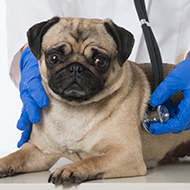
Working group outlines commitments to redress serious welfare issues.
The Brachycephalic Working Group (BWG) is calling on all UK organisations to show responsible behaviours and greater awareness of the health issues associated with brachycephalic dogs.
The group has outlined a set of actions to directly tackle welfare issues and shift societal attitudes away from acquiring dogs with extreme physical traits.
Already adopted by BWG member organisations, the commitments include a pledge to never use images of dogs with brachycephaly for advertising (unless to highlight health and welfare issues), and to widely share the public message ‘Stop and think before buying a flat-faced dog.’
BWG chair Dan O’Neill stated that moving away from the normalisation of extreme body shapes in dogs “requires an active commitment from everyone who cares about dogs to finally say ‘no more’ to this suffering.”
He added: “These new BWG commitments finally make it explicit how organisations should behave to protect future dogs from having extreme body shapes – there are no longer any excuses for being part of the problem rather than the solution.”
Founded in 2016, the BWG consists of various stakeholders, including veterinary organisations, breed clubs, kennel clubs, universities, and government bodies, all working together to improve the health and welfare of brachycephalic dogs. Despite extensive efforts to raise awareness of the issues affecting these dogs, the BWG says many people remain unaware of the problems and the importance of not acquiring brachycephalic breeds.
It hopes that with commitment for responsible behaviours from all UK organisations, this low public awareness can be improved, helping the group ‘progress towards the BWG vision of a world where no dog experiences health-related welfare problems’ attributed to selective breeding.
The key commitments to redress the welfare issue caused by brachycephaly in dogs include:
- Commit to explicitly stating the health and welfare of dogs is a high priority for the work of that organisation.
- Commit to working collaboratively with other welfare-focused organisations to resolve the brachycephalic health and welfare crisis in dogs.
- Commit to full compliance with all relevant national legislation in relation to brachycephaly and extreme conformation in dogs.
- Commit to applying scientific evidence-based principles in all decision-making in relation to brachycephaly in dogs.
- Commit to support increased genetic diversity which may include controlled and appropriate outcrossing where necessary to promote less extreme conformation in dogs where there is adequate supporting evidence for health and welfare gains. Note: The Bulldog Breed Council Member Clubs, the French Bulldog Breed Clubs and the Pug Breed Clubs are currently not in a position to commit to supporting outcrossing.
- Commit to never using imagery of dogs with brachycephaly for advertising unless such use is aimed specifically at protecting the health and welfare of dogs in relation to brachycephaly.
- Commit to widely sharing a public message of ‘Stop and think before buying a flat-faced dog.’
- Commit to support training and education within their own memberships on the health and welfare issues related to brachycephaly.
The BWG invites all organisations, businesses, and individuals concerned with the welfare of dogs to adopt these principles to ‘safeguard the future of brachycephalic dogs and eliminate the health issues they face’.
For more information about the BWG and to read its full position statement, please visit ukbwg.org.uk
Image (C) Shutterstock.



 The Veterinary Medicines Directorate (VMD) is inviting applications from veterinary students to attend a one-week extramural studies (EMS) placement in July 2026.
The Veterinary Medicines Directorate (VMD) is inviting applications from veterinary students to attend a one-week extramural studies (EMS) placement in July 2026.